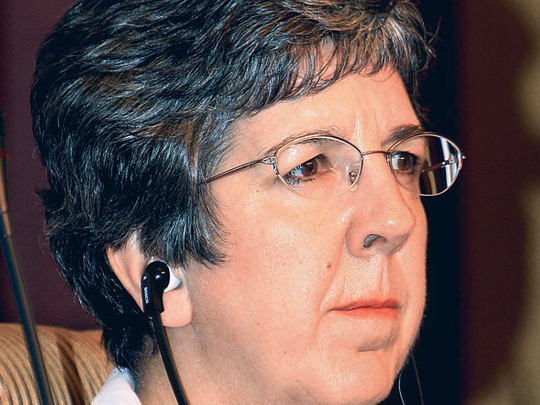
Abu Dhabi: Economists and scholars on Tuesday shared views on a roadmap for an education system that can meet labour market requirements across the GCC region.
During the 15th Emirates Centre for Strategic Studies and Research (ECSSR) annual conference yesterday, Dr Lynn A. Karoly, a senior US economist, said education helps increase the productivity of human capital and that equality of education is the key word.
Closing the gender gap in enrolment and degree choices should be a priority for the GCC countries, with emphasis on job training programmes.
Shortfall
According to the economist of the RAND Corporation, some of the areas of concern regarding education across the GCC countries are shortfall in enrolment for secondary education, especially among male students in Kuwait, Oman and Saudi Arabia. Girls are more likely to be involved at the secondary level compared to boys.
Elementary and secondary school students are also far from attaining mathematics, science, and reading skills, in comparison to international standards. "There are gaps in knowledge of key subjects, especially among boys in Grade 4 science classes," she said. Unemployment across the GCC is mainly caused by a mismatch between skills and job requirements.
"Many Emiratis in the UAE prefer to work in the public sector, and those jobs are saturating and queues are growing. The public sector doesn't want to expand any more, which normally causes a mismatch between what a person can offer and what the job asks for," Karoly told Gulf News on the sidelines of the conference.
Trends
Through a test known as TIMMS (trends in international mathematics and science study) that helps collect educational achievement data to provide information about trends in performance, researchers concluded that Grade 8 mathematics and science students that scored high grades, were in nations such as Taiwan, Korea, Singapore, Hong Kong and Japan.
"The nations that scored the lowest grades were five of the GCC countries, Bahrain, Oman, Kuwait, Saudi Arabia and Oman. Dubai stood in the middle," said Dr Alexander W. Wiseman, Associate Professor, College of Education at Lehigh University.
"Research shows that school-based courses and training that relate to future work don't impact labour market success as much as actual work experience that youths receive in the labour market. Formal education can impact a society, but the burden should not just be education, we have to change our direction in the GCC region and follow the Asian route," said the professor.
Citing data of a research conducted among Grade 8 students in Dubai and Oman, Wiseman found that students link what they learn in school with their future success which he feels is a little unusual.
"Along with education there should be more impact on religion, the family and the business community," Wiseman told Gulf News.
Conference: Recommendations and key findings
Dr Alexander W. Wiseman, Associate Professor, College of Education at Lehigh University:n 31 per cent of Grade 8 students in Dubai felt their science lessons are related to their daily lives, with 48 per cent of Grade 8 students from Oman agreeing;n 51 per cent of students from Dubai and 75 per cent of students from Oman feel they have to do well in their science classes in order to get the job they want in the future;
Dr. Lynn A. Karoly, a Senior Economist, RAND Corporation:n Workforce participation is defined as people working or looking for work, which she believes is strongly related to education. The following figures are in Saudi Arabia and Qatar:n 61 per cent of men in Saudi Arabia are in the labour force, and 12 per cent women;n 62 per cent of men in Qatar are in the labour force and 35 per cent women;n 90 per cent of those working are university graduates.
Professor Andries de Grip, Professor of Economics at Maastricht University, the Netherlands:n Companies should invest in training in order to upgrade an employees' skills — for instance an evident increase in earnings occurred in the the following countries due to investing in short training courses for employees: n 2 per cent in the UK n 4 per cent in Italy n 10 per cent in Portugal













